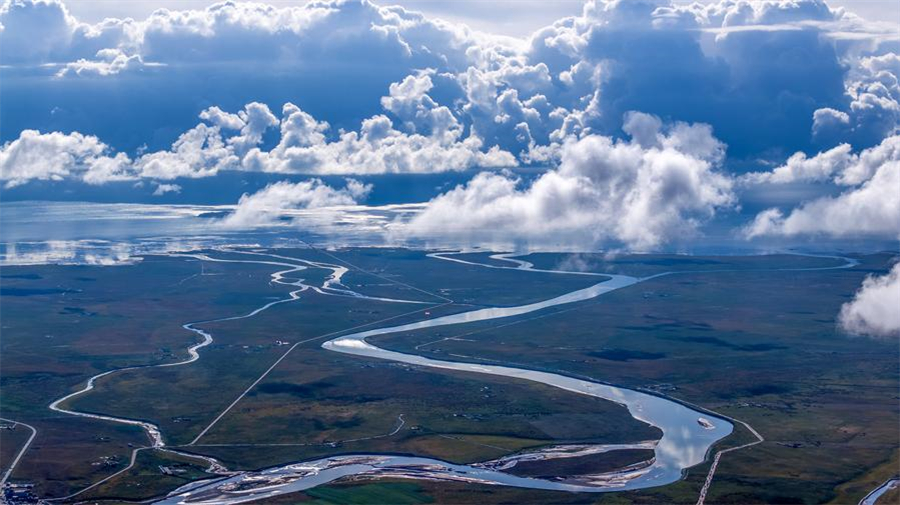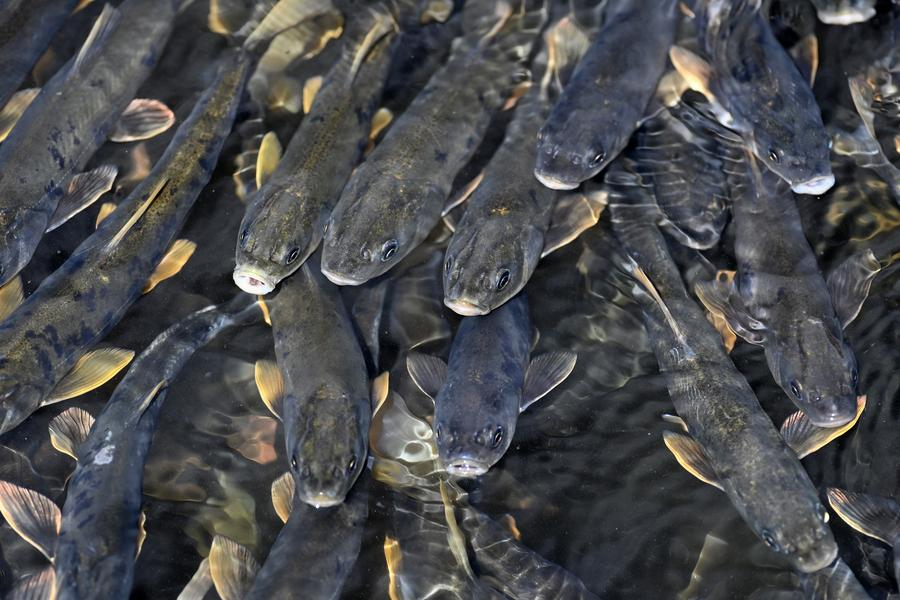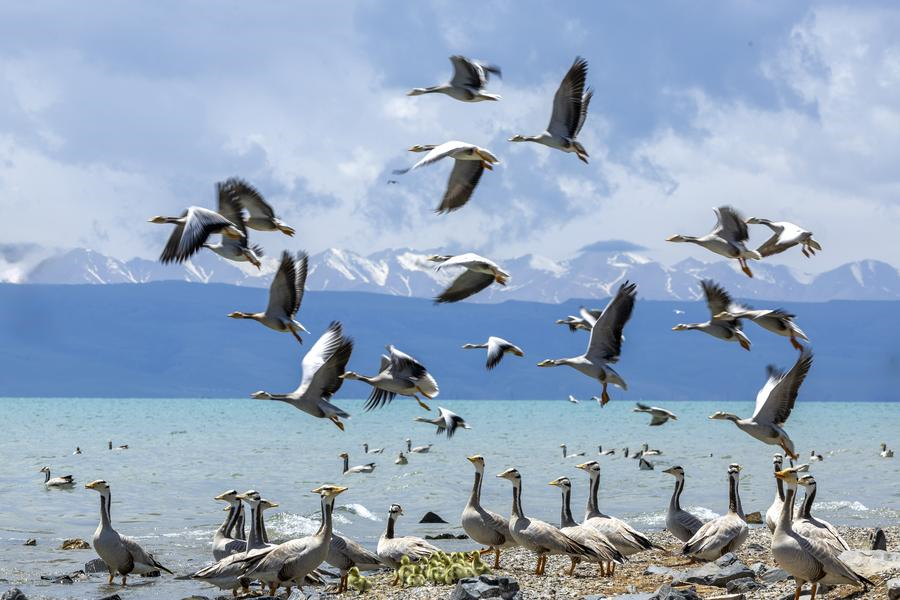Conservation efforts help rare fish flourish in China's largest lake
* Located in the northeastern part of the Qinghai-Xizang Plateau, Qinghai Lake is an important ecological barrier in northwest China, which has pivotal status in terms of ecological security.
* Decades ago, the population of naked carp had declined sharply due to overfishing and environmental deterioration. Through continuous protection efforts, from 2002 to 2023, the naked carp population in Qinghai Lake had recorded a nearly 46-fold increase.
* The recovery of the naked carp and the local community's transformed perception of resources have paved the way for ecological protection of Qinghai Lake.
XINING -- Tens of thousands of naked carp, an endemic species in Qinghai Lake, the largest lake in China, swim upstream against the current to spawn, creating a spectacular scene with the river packed with these fish.
Also known as "Huangyu" in China, these scaleless carp are currently embarking on their spawning migration in the Quanji River in Gangca County, Haibei Tibetan Autonomous Prefecture, northwest China's Qinghai Province.

An aerial drone photo taken on Sept. 20, 2023 shows a view of Qinghai Lake in northwest China's Qinghai Province. [Photo by Yang Tao/Xinhua]
Decades ago, the population of naked carp had declined sharply due to overfishing and environmental deterioration. In 2002, Qinghai Lake had only approximately 2,592 tonnes of naked carp.
In the past, many residents of Gangca County made a living by fishing. Xinquan Village, with 251 households, was an example.
"In the 1980s and 1990s, due to poor living conditions and low crop yields, more than 90 percent of villagers in Xinquan relied on fishing for their livelihood," recalled Sheng Shengmei, deputy Party secretary of the village.
Dai Huansheng, 56, was once a fisherman from Xinquan. After finishing junior school in mid-1980s, Dai started to use makeshift rafts made from car tires to fish in Qinghai Lake along with fellow villagers.
"A net measuring 40 meters long and 1 meter wide could yield more than 300 kilograms of fish in summer," Dai said. During winter, they would also drill holes in the frozen lake to set nets under the ice.
Naked carp gradually became a vital food source for locals. In addition, villagers bartered dried fish for vegetables, fruits, and other necessities or sold them for supplemental income during times of financial hardship.
However, uncontrolled fishing led to a drastic decline in the naked carp population in Qinghai Lake, posing a severe threat not only to this core species, but also to the lake's ecosystem.
Without the naked carp, Qinghai Lake would eventually become a "dead lake," according to experts.

Migratory adult naked carp swim upstream in the Quanji River, an inflow river of Qinghai Lake, in Gangca County of Haibei Tibetan Autonomous Prefecture, northwest China's Qinghai Province, June 30, 2022. [Xinhua/Fan Peishen]
Starting from 2021, the local government implemented its sixth ban on naked carp fishing in Qinghai Lake and rivers upstream, to boost stocks of this rare species and better protect the ecosystem of the plateau lake. The ban will last till the end of 2030.
Through continuous protection efforts, from 2002 to 2023, the naked carp population in Qinghai Lake had recorded a nearly 46-fold increase. Currently, reserves of this species have been restored to 120,000 tonnes.
Today, many tourists flock to Gangca County to watch the migration journey of the naked carp.
"Many local residents now rely on transportation, husbandry, farming, and tourism for their income, resulting in a transformation of the local industry. People's average annual incomes have also exceeded 20,000 yuan (about 2,808 U.S. dollars)," Sheng Shengmei noted.
Guo Yongzhong, 55, once a fisherman, now sells fish feed and local specialties to tourists near the Quanji River together with his wife. The couple earned over 100,000 yuan last year.
Local people's perception of the rare fish species has changed over the years. Notably, on occasions when the river flow stopped and fish were stranded, Xinquan villagers volunteered to transport the fish back to the lake with wooden pots.
The recovery of the naked carp and the local community's transformed perception of resources have paved the way for ecological protection of Qinghai Lake.
In 2020, the water level of Qinghai Lake had reached 3,196.62 meters, 3.65 meters higher than the 2004 level.
Located in the northeastern part of the Qinghai-Xizang Plateau, Qinghai Lake is an important ecological barrier in northwest China, which has pivotal status in terms of ecological security. It is also called the "biological gene bank on the plateau."
Besides providing key migratory channels for naked carp, Qinghai Lake is also an important stopover site for migratory birds and the habitat of many rare and endangered species.

This photo taken on May 24, 2024 shows bar-headed geese near Qinghai Lake in northwest China's Qinghai Province. [Photo by Yang Tao/Xinhua]
The lake has seen its ecological environment improved and biodiversity rapidly restored in recent years.
In 2022, China approved a plan to establish a national park at Qinghai Lake.
Tang Xiaoping, head of the National Park Research Institute, said that China's national park construction has become a cornerstone of biodiversity conservation, safeguarding critical habitats and providing shelters for wild animals and plants.
"We have got a lot from nature, and we must cherish it even more," said Namgyal, a resident of Haibei Tibetan Autonomous Prefecture.
Video reporters: Li Linhai, Geng Huihuang; Video editors: Zhang Qiru, Luo Hui
























